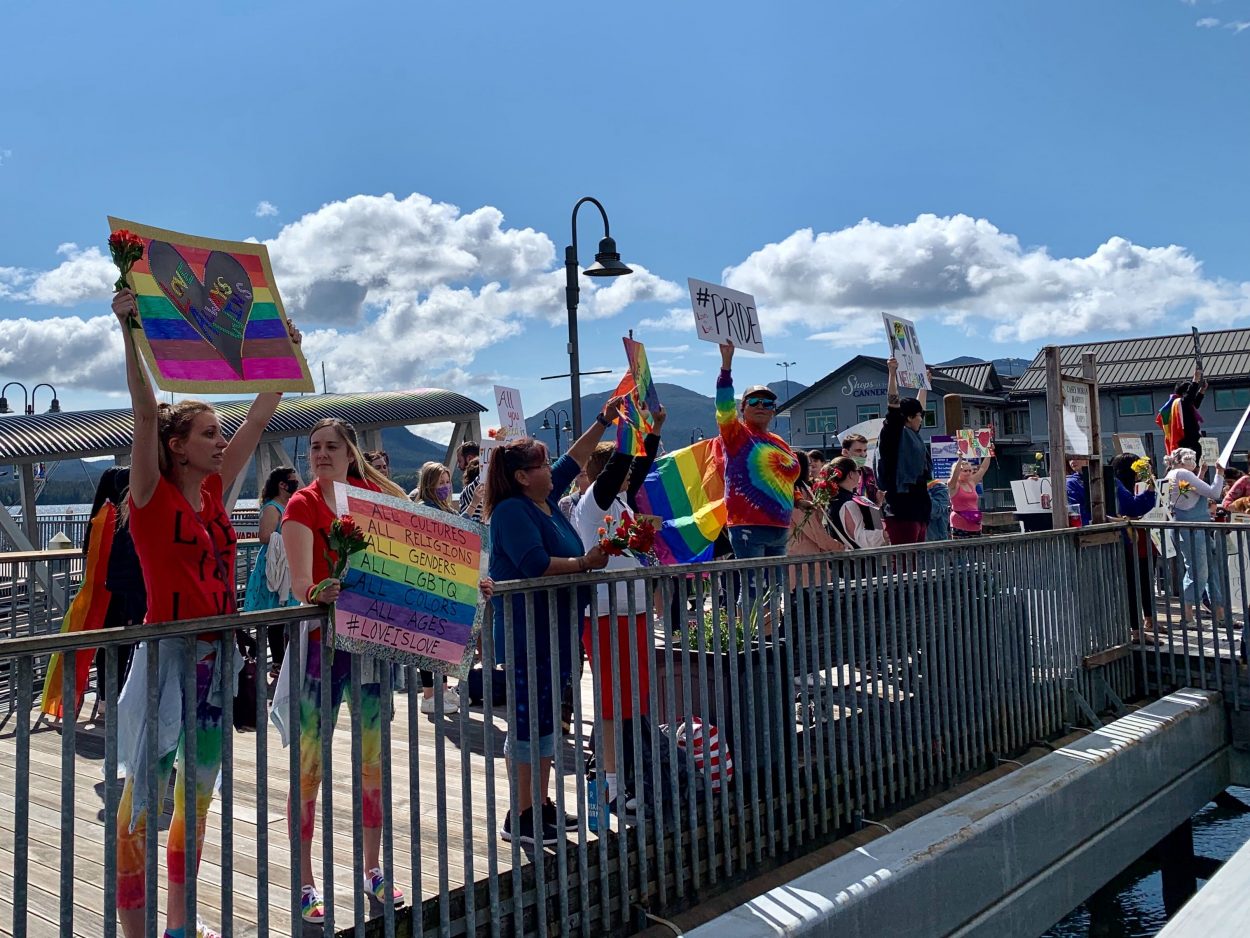Protesters gathered June 5 on Ketchikan’s Berth 3 promenade to demonstrate outside a flower shop that reportedly refused to take an order for a same-sex wedding. Ketchikan’s Borough Assembly overrode a mayoral veto and asked state lawmakers to protect LBGTQ people from discrimination on Tuesday. (Eric Stone/KRBD)
Ketchikan’s Borough Assembly is calling on the state legislature to pass a law outlawing discrimination on the basis of sexual orientation, gender identity and gender expression. That’s following a 5-2 vote Monday overriding Mayor Rodney Dial’s veto of the measure, which passed last month.
It’s impossible to talk about LGBTQ rights in Ketchikan without talking about a downtown flower shop that reportedly refused to take an order for a same-sex wedding.
The move prompted a well-attended demonstration across the street from the Heavenly Creations flower shop the next day. And not long afterwards, Ketchikan’s City Council banned discrimination on the basis of sexual orientation, gender identity and gender expression within city limits.
But as there’s no state law extending those protections and it’s not clear whether boroughs have the authority to offer them. That leaves Ketchikan’s outskirts unaffected by the city ordinance.
So Ketchikan’s borough government weighed in last month to change that.
“I think it’s sad that this day and age – actually, it’s not sad, it’s a travesty that this day and age we have to make laws like this,” said Ketchikan Gateway Borough Assembly Member Sven Westergard at the assembly’s August 17 meeting. He co-sponsored a resolution asking the state legislature to protect LGBTQ people’s rights across Alaska.
“To not judge a person by their acts and what they do, if they’re a good or bad person, we judge them by how they look or who they love, it just boils my blood,” Westergard continued.
That nonbinding resolution — which was also co-sponsored by Assembly Member A.J. Pierce — passed 6-1.
But the borough mayor vetoed the resolution. Rodney Dial cited his faith and said he couldn’t support a law that he said would require Christian artists to create works that violate their religious beliefs protected by the Bill of Rights.
He expanded on that reasoning with a 15-minute slideshow citing court cases from across the country challenging similar laws during a Borough Assembly meeting just after Labor Day.
“This resolution was about moving discrimination around — transferring it from one group to another because government was making a moral decision that one group’s rights were more important than the other’s.
Dial’s presentation culminated with a request to add two more groups to those protected from discrimination under state law.
“You can obviously prove me wrong tonight. You can use this resolution to address the greatest discrimination that our country is facing at this moment, which is discrimination against law enforcement officers,” Dial said.
The retired Alaska State Trooper said discrimination against police officers was in his eyes “by far a greater problem.”
“Any guess what the second-most persecuted group in America currently is? It’s Christians and people of faith,” Dial said.
He asked that the assembly amend the resolution to request anti-discrimination protections for law enforcement and Christians.
“When I vetoed this resolution I hoped you would come back with a different document, respecting the rights of all citizens, a joint statement we could all get behind — that all rights matter,” Dial said.
That’s a play on “All Lives Matter” — a phrase commonly seen as a rebuke of the racial justice slogan “Black Lives Matter.”
But the borough clerk told KRBD that procedural issues prevented the assembly from taking up Dial’s amendment to fold in cops and Christians in the LGBTQ rights resolution.
Public opinion on the anti-discrimination resolution was split — through two hours of public comment, nine spoke for supporting LGBTQ protections and five submitted letters; seven spoke out against the resolution.
Assembly Member David Landis said he also consulted his Christian faith.
“But ultimately, it comes down to a legal conclusion,” he said. “I was tempted to search the internet and cherry-pick things that looked good to me and build a case for whatever.”
But instead Landis quoted from an email he said he received from the borough’s own legal counsel, Glenn Brown.
“There’s nothing inherent unconstitutionally — inherently unconstitutional in the substance of the resolution, nor, in my opinion, adding the requested language to the Alaska Human Rights Law should the legislature ultimately act on the assembly’s request,” Landis said.
Assembly Member Alan Bailey initially supported the resolution for LGBTQ protections. But he had an apparent change of heart and joined Assembly Member Sue Pickrell in opposing it. He said the incident at the flower shop had been blown out of proportion and the issue of discrimination against LGBTQ people in Ketchikan had unnecessarily divided the community.
That left a five-vote majority, exactly the number needed to pass the request for state anti-discrimination protections over Dial’s veto.
That may not be the end of the story, though. In a brief phone interview, Assembly Member Pickrell said she’s considering sponsoring a resolution to ask the legislature to outlaw discrimination against Christians and police — just as the borough mayor had suggested.
Rebecca Tauber contributed reporting
.






